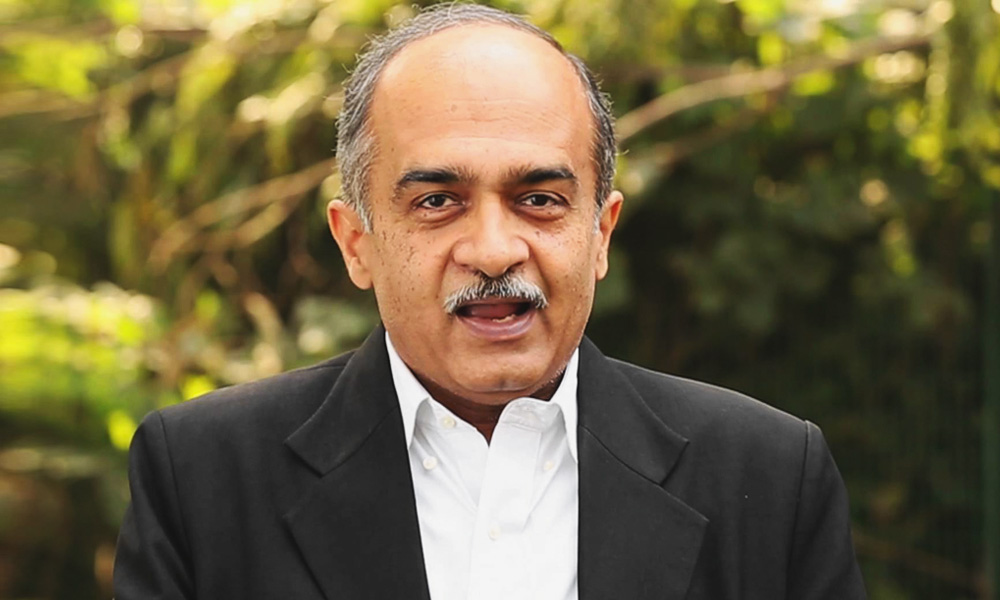
Credits: AajTak
Access To Freedom Of Speech And Right To Dissent: Advocate Prashant Bhushan Case Raises Concerns
India, 23 Aug 2020 10:53 AM GMT | Updated 23 Aug 2020 12:50 PM GMT
Editor : Shubhendu Deshmukh |
Shubhendu, the quint essential news junky, the man who loves science and politics in equal measure and offers the complete contrast to it by being a fan of urdu poetry as well.
Creatives : Abhishek M
" An engineer by profession, Abhishek is the creative producer of the team, graphic designing is his passion and travelling his get away. In more ways than one, he makes the content visually appealing."
Bhushan's case has put India's most respected institution under the spotlight, and raises concerns over the institution's receptivity of criticism. It also questions the judges' arguments over the boundaries or limits of what can be said.
In India, Freedom of Speech is a fundamental right guaranteed in our Constitution. It holds the power to reinforce human rights, allowing society to develop and progress by expressing opinions, raise concerns over questionable authorities, and hold the people in power accountable when they are deceitful.
Free Speech has been important throughout history because it has been used to fight for and achieve the required change. It is not only about one's ability to speak but the ability to listen to others and allow other views to be heard. In a nutshell, a free society can exist until the existence of freedom of speech.
However, the debate over the extent of free speech takes for granted the value of free speech. Speaking about Prashant Bhushan's case, the Supreme Court found him guilty of contempt over his tweets against the top court and the chief justice, which were later removed by the social media platform.
He commented about an 'undeclared emergency' and the role of the Supreme Court and the last four chief justices of India in it and how democracy has been destroyed in the country for the past six years, with judiciary being involved in it.
Rationalising the reason for holding Bhushan guilty of contempt, the court the tweet 'has the effect of destabilising the very foundation of this important pillar of the Indian democracy and directly affronts the majesty of the law'.
The second tweet was about Chief Justice of India SA Bobde, who was clicked on a Harley Davidson superbike in his hometown Nagpur during the lockdown period amid the coronavirus outbreak, without wearing any protective gear. To this, the Supreme Court ruled the tweet was 'patently false' and had the tendency to shake the confidence of the public', as per the Reuters report.
However, Bhushan later expressed his regret for commenting on chief justice for not wearing a helmet after it was clarified the chief justice was not riding and stood by the rest.
According to The Indian Express report, after being held guilty, Bhushan said that various judgments, reports, and statements of judges in the past have discussed corruption in the judiciary and referred to observations on the subject in the 1964 Parliamentary report of the Committee on Prevention of Corruption.
"Without the allegations (of corruption) against a judge being documented and investigated in the manner further provided under the Judges Inquiry Act, to establish the veracity, the allegation per se cannot amount to contempt in so far as it would nullify the constitutional provisions and statutory procedures for impeachment of a judge on grounds of misbehaviour including corruption," his statement read.
Bhushan, one of India's prominent lawyers now faces a Monday deadline to submit his apology to the apex Court or risk jail in a case that has tested the judiciary's openness to criticism and sparked a debate on freedom of speech.
The top court on Thursday ordered Bhushan, who has challenged public interest litigation, to issue an 'unconditional apology' by Monday or face up to six months in jail or a fine of ₹2,000 or both.
The court further said if Bhushan submits his apology, it would hold a hearing on Tuesday without clarifying the judiciary's response if one of their given choices is adhered to.
"Any apology would be insincere," Bhushan told the media, declining to comment further as the matter is ongoing.
Speaking to The Hindu, Former Attorney General of India Soli Sorabjee said the court could have overlooked the first tweet and the other comment was simply an opinion. None of these, in any way, qualify for contempt of court. "Warn him, but not punish him for this. It is rather a delicate balance to keep," Sorabjee says.
Many people, however, supported the SC's decision, saying that nobody was above the law.
However, several lawyers, former advocates and citizens came out in Bhushan's support, saying the court has been harsh on him. An online petition signed by more than 2,400 lawyers read that 'this judgment does not restore the authority of the court in the eyes of the public. Rather, it will discourage lawyers from being outspoken... A bar silenced under the threat of contempt, will undermine the independence and ultimately the strength of the Court. A silenced bar, cannot lead to a strong court."
Bhushan's case has put India's most respected institution under the spotlight and raises concerns over the institution's receptivity of criticism. It also questions the judges' arguments over the boundaries or limits of what can be said.
All things considered, factors of what comprises contempt of court have never been set down descriptively. Similarly what qualifies breach of Parliament's privileges is also not clear. As a result, Members of the Parliament and the Judges have the authorisation to decide what benefits or goes against them. Bhushan's comments have been within the bounds of exceptions.
Attack on Bhushan seems like an attack on free speech, considering the 'gravity' of his comments and the judiciary's response to it. It must be clear that Freedom of Speech is not just showering praises on those in power, but the right to tell the bitter truth, to criticise and raise dissent, irrespective of the platform.
A democracy without dissent does nothing but stops the growth of any nation and its people. Such control and judgments over a person's comment, that in no way is promoting hate speech, or qualifies as derogatory remarks against the nation's biggest institution, is seen only in highly regulated countries and not India.
Democracy is known to function with strong minds, strong leaders, strong ideologies and opinions. This not only is the evidence of growth but a sign of magnanimity and freedom.
Making such judgement under the garb of the fundamental right clearly shows the incapability of the judiciary to receive criticism over its functioning or alleged involvement in misconduct, clearly shakes up the public confidence and most importantly, its ability to protect the rights of its citizens.
Also Read: Bloomsbury India Withdraws Publication Of Book On Delhi Riots After Receiving Backlash Over Launch
 All section
All section














